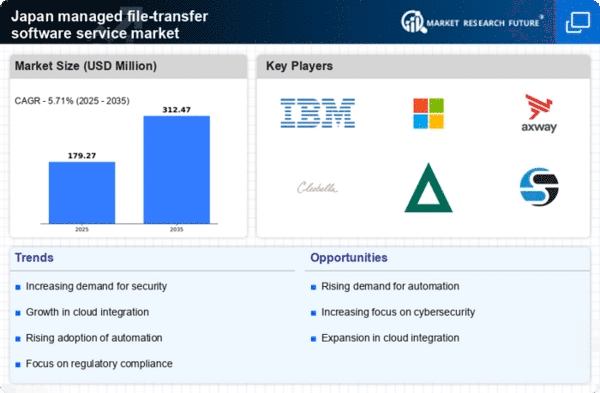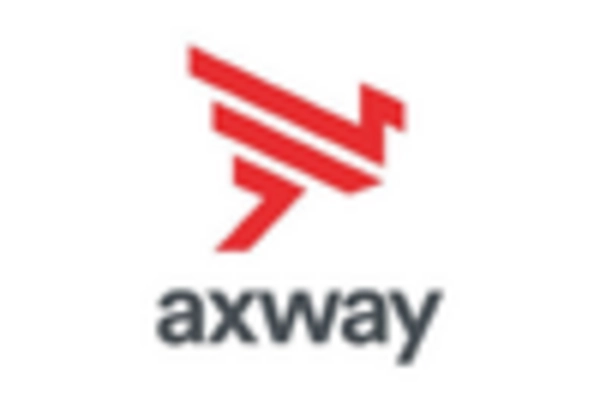Rising Need for Data Security
In the context of the managed file-transfer-software-service market, the escalating need for data security is a pivotal driver. With cyber threats becoming increasingly sophisticated, organizations in Japan are prioritizing secure file transfer methods to protect sensitive information. The market is witnessing a surge in demand for encryption and authentication features, which are essential for safeguarding data during transmission. According to recent studies, approximately 70% of Japanese companies consider data security a top priority, leading to a projected market growth of 12% over the next few years. This emphasis on security is likely to shape the future landscape of the managed file-transfer-software-service market.
Increasing Regulatory Compliance
The managed file-transfer-software-service market in Japan is experiencing growth driven by stringent regulatory compliance requirements. Organizations are compelled to adhere to various data protection laws, such as the Act on the Protection of Personal Information (APPI). This legislation mandates secure handling of personal data, thereby increasing the demand for robust file transfer solutions. Companies are investing in managed file transfer services to ensure compliance, mitigate risks, and avoid potential penalties. The market is projected to expand as businesses prioritize compliance, with an estimated growth rate of 15% annually. This trend indicates a strong alignment between regulatory frameworks and the adoption of secure file transfer solutions.
Adoption of Advanced Technologies
The managed file-transfer-software-service market is being propelled by the adoption of advanced technologies such as artificial intelligence (AI) and machine learning (ML). These technologies enhance the efficiency and effectiveness of file transfer processes, enabling organizations to automate workflows and improve data handling. In Japan, businesses are increasingly leveraging AI-driven solutions to optimize file transfers, reduce errors, and enhance user experience. The integration of these technologies is expected to contribute to a market growth rate of around 10% annually. This trend suggests that the managed file-transfer-software-service market is evolving to meet the demands of a technologically advanced business environment.
Growing Demand for Remote Work Solutions
The managed file-transfer-software-service market is witnessing a surge in demand for solutions that facilitate remote work. As organizations in Japan adapt to flexible work arrangements, the need for secure and efficient file transfer solutions has become paramount. Companies are seeking managed file transfer services that enable employees to access and share files securely from remote locations. This shift is likely to drive market growth, with estimates suggesting an increase of 18% in adoption rates over the next few years. The emphasis on remote work solutions indicates a significant transformation in how businesses approach file management and security.
Expansion of E-commerce and Digital Services
The managed file-transfer-software-service market is benefiting from the rapid expansion of e-commerce and digital services in Japan. As online transactions and digital communications increase, the need for secure file transfer solutions becomes critical. E-commerce platforms require reliable methods to handle sensitive customer data, including payment information and personal details. This demand is expected to fuel market growth, with projections indicating a rise of 14% in the adoption of managed file transfer services among e-commerce businesses. The intersection of digital transformation and secure file transfer solutions is likely to shape the future of the managed file-transfer-software-service market.
















